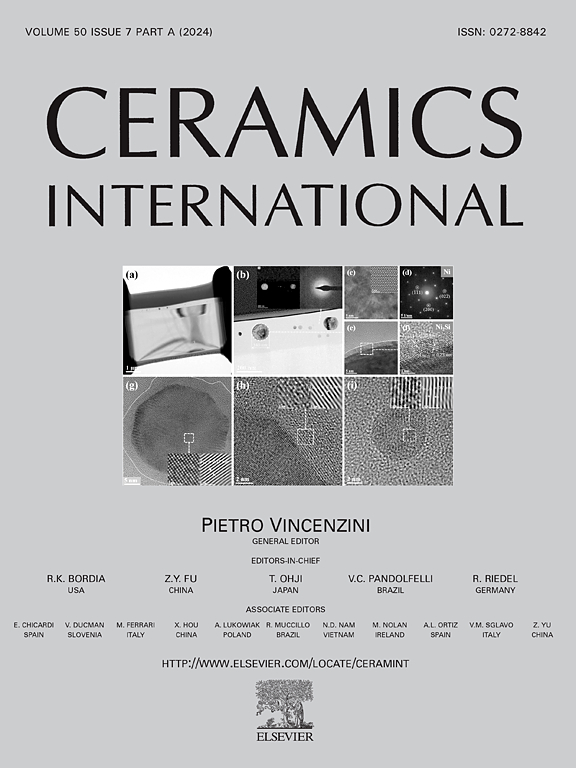通过无电解电镀提高中温固体氧化物燃料电池的 Ag 改性 Bi0.7Sr0.3FeO3 阴极的电化学性能
IF 5.1
2区 材料科学
Q1 MATERIALS SCIENCE, CERAMICS
引用次数: 0
摘要
通过原位化学镀银对 BSFO 进行改性,制备出了 Bi0.7Sr0.3FeO3-δ (BSFO) -Ag 复合阴极。镀银有效降低了 BSFO 的极化电阻(Rp)。当银离子含量为 20 wt% 时,BSFO 在 650 °C 空气条件下的最佳极化电阻为 0.35 Ω cm2,仅为 BSFO 阴极(1.88 Ω cm2)的 18.6%。电化学性能的提高主要归功于 BSFO-Ag 界面的低氧吸附能(Eads)域,正如第一原理计算(Eads,-0.81eV)所示。因此,添加 Ag 改变了阴极反应速率控制步骤,从分子氧在阴极表面的吸附和扩散转变为阴极上的电荷转移。以 H2(∼3 vol% H2O)为燃料,制备的单电池在 650 °C 时的最大功率密度(Pmax)为 450.98 mW cm-2。在电流密度为 400 mA cm-2 时,开路电压(OCV)在 50 小时后没有明显衰减(约 0.66 V),显示出良好的长期稳定性。本文章由计算机程序翻译,如有差异,请以英文原文为准。
Improved electrochemical performance of Ag-modified Bi0.7Sr0.3FeO3 cathodes by electroless plating for intermediate-temperature solid oxide fuel cells
The Bi0.7Sr0.3FeO3-δ (BSFO)-Ag composite cathode is prepared by modifying BSFO with in-situ chemical plating of Ag. The plated Ag effectively reduces the polarization resistance (Rp) of BSFO. At the Ag loading of 20 wt%, the optimized Rp of BSFO at 650 °C in air condition is 0.35 Ω cm2, which is only 18.6 % of that of BSFO cathode (1.88 Ω cm2). The electrochemical performance improvement is primarily attributed to the low oxygen adsorption energy (Eads) domain at the interfaces of BSFO-Ag, as indicated by the first-principles calculations (Eads, −0.81eV). Thus, the addition of Ag changes the cathodic reaction rate control step from the molecular oxygen on the cathode surface adsorption and diffusion to charge transfer on the cathode. The maximum power density (Pmax) of the prepared single cell at 650 °C is 450.98 mW cm−2 using H2 (∼3 vol% H2O) as fuels. The open-circuit voltage (OCV) does not decay significantly (around 0.66 V) after 50 h at the current density of 400 mA cm−2, showing good long-term stability.
求助全文
通过发布文献求助,成功后即可免费获取论文全文。
去求助
来源期刊

Ceramics International
工程技术-材料科学:硅酸盐
CiteScore
9.40
自引率
15.40%
发文量
4558
审稿时长
25 days
期刊介绍:
Ceramics International covers the science of advanced ceramic materials. The journal encourages contributions that demonstrate how an understanding of the basic chemical and physical phenomena may direct materials design and stimulate ideas for new or improved processing techniques, in order to obtain materials with desired structural features and properties.
Ceramics International covers oxide and non-oxide ceramics, functional glasses, glass ceramics, amorphous inorganic non-metallic materials (and their combinations with metal and organic materials), in the form of particulates, dense or porous bodies, thin/thick films and laminated, graded and composite structures. Process related topics such as ceramic-ceramic joints or joining ceramics with dissimilar materials, as well as surface finishing and conditioning are also covered. Besides traditional processing techniques, manufacturing routes of interest include innovative procedures benefiting from externally applied stresses, electromagnetic fields and energetic beams, as well as top-down and self-assembly nanotechnology approaches. In addition, the journal welcomes submissions on bio-inspired and bio-enabled materials designs, experimentally validated multi scale modelling and simulation for materials design, and the use of the most advanced chemical and physical characterization techniques of structure, properties and behaviour.
Technologically relevant low-dimensional systems are a particular focus of Ceramics International. These include 0, 1 and 2-D nanomaterials (also covering CNTs, graphene and related materials, and diamond-like carbons), their nanocomposites, as well as nano-hybrids and hierarchical multifunctional nanostructures that might integrate molecular, biological and electronic components.
 求助内容:
求助内容: 应助结果提醒方式:
应助结果提醒方式:


